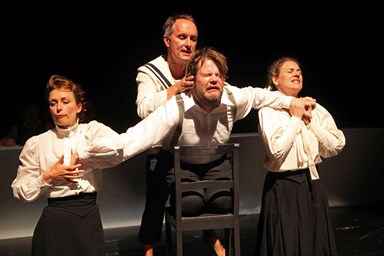
shows
Geschichte (Histoire/Story)
Libretto Galin Stoev, staging Titus Selge, Costumes Astrid Eisenberger

The play opens on Witold - Gombrowicz, the author - and when the stage lights up, in the early morning, we are plunged into the familial house, at the end of Witold’s childhood.
The family searches Witold, the seventeen years old young adolescent. Witold comes back from school barefoot, « like a farmer ». This small detail triggers off a storm in the middle-class family : being barefoot is a betrayal to the moral principles of the familial institution and of the society in general. Witold’s ability to take his « maturity test» (the equivalence of the a-level ) is questionned. This exam only can prove that Witold has matured.`
The family turns into an exam jury in which each professor describes Witold according to their own fantasies « you obtained the Immaturity Champion’s title ». Witold is not fooled and says it…The family declares him degenerate…his fiancée is offended by Witold not being a « normal » boy and, in order to strengthen him, suggests to send him to the army.
The family turns into a draft board. Witold does not submit. The family calls the police ! The family turns into a court and the prosecutor reads the charges. The defendant is condamned to be in chains and to five years of hard labour. He does not have the right to speak anymore.
The adolescent claims his immaturity to be an act of resistance : his voice, his power of speech, his thoughts and his fantasies…Witold identifies with God, imagines he carries the world, empathizes with what’s going on, rambles and believes that he killed the archduke in Sarajevo.
Now, we are at the russian czar’s court, the family turns into an imperial family. Nicolas II gathers his counsellers, the situation is serious, how can they avoid the war ? Witold is send as a messenger to convince the austro-hungarian emperor. Witold arrives in Berlin and asks to be received by Guillaume II.
The latter is impulsive and weak, his counsellers want to go at war.
Gombrowicz suspends this operetta on the impossibility to prevent History from getting out of control and Witold shows us the only possible way. To refuse to accept the leaders’positions, to remain humain, remain in a post-adolescent state of mind : refusal when confronted to absurdity.
(c.dormoy –marie-michele delprat / gradignan 5th january 2012)
Partnership NVS Musikderjahrhundert - Company le Grain coproduction OARA (office artistique de la Région Aquitaine) with the support of Théâtre des 4 saisons, Goethe Institut of Bordeaux, Scène nationale of Quimper.